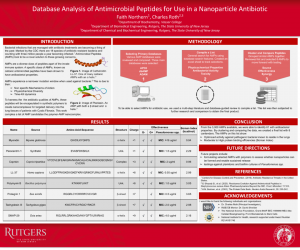Northern, Faith: Database Analysis of Antimicrobial Peptides for Use in a Nanoparticle Antibiotic
Title: Database Analysis of Antimicrobial Peptides for Use in a Nanoparticle Antibiotic
Name: Faith Northern
Home Institute: Vassar College
Programs: RISE program, REU – Cellular Bioengineering
Other contributors: Charles Roth
Abstract: Antimicrobial Peptides (AMPs) are a diverse group of naturally-occurring molecules that act as first responders in multicellular organisms. Through years of research and discoveries, scientists now believe that AMPs may have widespread use as antibacterial agents. To date, nearly 3,000 AMPs have been discovered, created, and chemically modified, yet only seven have been approved by the U.S. Food and Drug Administration for medicinal use. Previous research that demonstrates topical application of AMPs as effective against bacterial infections have set the groundwork for the possibility of pairing AMPs with delivery systems targeted to various tissues in the body. Dr. Charles Roth’s laboratory is looking to embody this idea by using AMPs to eradicate the presence of biofilms in the lung tissues of Cystic Fibrosis patients. Our group has found success in our approach in encapsulating AMPs in synthetic polymers that self-assemble into bioactive nanoparticles. The goal of the current work is to determine which among the thousands of candidate AMPs would be the most effective in this nanoparticle delivery system. This work utilizes a database-guided review to combat this issue. We used several databases to complete a general search for natural, synthetic, and modified peptides with anti-bacterial activities, honing in on ones that were annotated as anti-biofilm. Next, the AMPs were clustered by various criteria such as their physicochemical properties (qualities like hydrophobicity, charge, length, structure, etc.) as well as their source and notated their effectiveness against numerous species of bacteria. Finally, in comparing AMPs within each cluster, the best were selected to move on for review. The goal is to begin utilizing the ability of these AMPs to penetrate and eradicate bacterial biofilms at micromolar concentrations. We hope to extend this work by formally testing the AMPs and analyzing how the physicochemical properties affect their efficacy in vitro.
Biography: Faith is a rising junior at Vassar College where she takes her liberal arts education seriously, triple majoring in Biochemistry, Educational Studies, and History. Post graduation, Faith looks to complete a PhD in Biomedical Engineering utilizing her interests in infectious diseases, proteomics, and the pharmaceutical sciences as her main areas of focus. As she continues her undergraduate career, Faith looks forward to continuing her research on the proteins of Tetrahymena thermophila. Faith is grateful for the Cellular Bioengineering program for giving her the space to grow as a student, both in research and professionally and wishes to thank her CB cohort, her PI, Dr. Charles Roth, and Professor’s David Shreiber and Susan Engelhardt, for their patience, understanding, and encouragement through the program.
